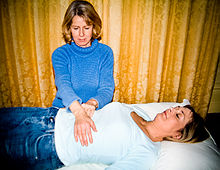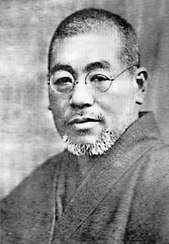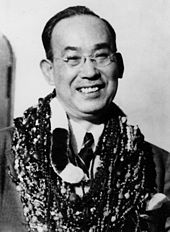This is an old revision of this page, as edited by Dustfreeworld (talk | contribs) at 18:57, 5 June 2024 (Tag materials that violates NPOV, per article’s talk page and consensus on NPOV notice board. Special:diff/1227423119 BTW, David specialises in cancer surgery, which means he provides some form of treatment to cancer patients, i.e. he is not independent and there can be COI. Also it’s just a potentially biased opinion piece / blog post from SBM. Not even a primary research. I don’t think such subpar source can support such exceptional/contentious/potentially derogatory claim.). The present address (URL) is a permanent link to this revision, which may differ significantly from the current revision.
Revision as of 18:57, 5 June 2024 by Dustfreeworld (talk | contribs) (Tag materials that violates NPOV, per article’s talk page and consensus on NPOV notice board. Special:diff/1227423119 BTW, David specialises in cancer surgery, which means he provides some form of treatment to cancer patients, i.e. he is not independent and there can be COI. Also it’s just a potentially biased opinion piece / blog post from SBM. Not even a primary research. I don’t think such subpar source can support such exceptional/contentious/potentially derogatory claim.)(diff) ← Previous revision | Latest revision (diff) | Newer revision → (diff) Pseudoscientific healing technique This article is about the Japanese pseudoscientific healing practice. For the era, see Reiki (era).
| Reiki | |||||||||||||
|---|---|---|---|---|---|---|---|---|---|---|---|---|---|
| Chinese name | |||||||||||||
| Traditional Chinese | 靈氣 | ||||||||||||
| Simplified Chinese | 灵气 | ||||||||||||
| |||||||||||||
| Vietnamese name | |||||||||||||
| Vietnamese alphabet | linh khí | ||||||||||||
| Korean name | |||||||||||||
| Hangul | 영기 | ||||||||||||
| Hanja | 靈氣 | ||||||||||||
| |||||||||||||
| Japanese name | |||||||||||||
| Hiragana | れいき | ||||||||||||
| Kyūjitai | 靈氣 | ||||||||||||
| Shinjitai | 霊気 | ||||||||||||
| |||||||||||||

Reiki (/ˈreɪki/ RAY-kee; Template:Lang-ja) is a form of energy healing originating in Japan. Energy healing is the pseudoscientific or magical belief that people can manipulate spiritual energy. Reiki practitioners use a technique called palm healing or hands-on healing through which, according to practitioners, a "universal energy" is transferred through the palms of the practitioner to the patient, to encourage emotional or physical healing.
Reiki is used as an illustrative example of pseudoscience in scholarly texts and academic journal articles. It is based on qi ("chi"), which practitioners say is a universal life force, although there is no empirical evidence that such a life force exists.
Clinical research does not show reiki to be effective as a treatment for any medical condition, including cancer, diabetic neuropathy, anxiety or depression. There is no reliable evidence for reiki therapy. Studies reporting positive effects have had methodological flaws.
Etymology


According to the Oxford English Dictionary, the English alternative medicine word reiki comes from Japanese reiki (霊気) "mysterious atmosphere, miraculous sign", combining rei "universal" and ki "vital energy"—the Sino-Japanese reading of Chinese língqì (靈氣) "numinous atmosphere".
Conceptual basis
| This section needs to be updated. Please help update this article to reflect recent events or newly available information. |
Reiki's teachings and adherents claim that qi is physiological and can be manipulated to treat a disease or condition. Qi does not exist as an observable phenomenon. Reiki is thus pseudoscientific practice based on metaphysical concepts.
Most research on reiki is poorly designed and prone to bias. There is no reliable empirical evidence that reiki is helpful for treating any medical condition, although some physicians have said it might help promote general well-being. In 2011, William T. Jarvis of The National Council Against Health Fraud stated that there "is no evidence that clinical reiki's effects are due to anything other than suggestion" or the placebo effect.
The 22 April 2014 Skeptoid podcast episode titled "Your Body's Alleged Energy Fields" relates a reiki practitioner's report of what was happening as she passed her hands over a subject's body:
What we'll be looking for here, within John's auric field, is any areas of intense heat, unusual coldness, a repelling energy, a dense energy, a magnetizing energy, tingling sensations, or actually the body attracting the hands into that area where it needs the reiki energy, and balancing of John's qi.
Technique
A session usually lasts for approximately an hour. "Level 1" practitioner places their hand on or near various parts of the body for several minutes. During this time a vital energy is meant to flow. "Level 2" Practitioners alternatively may offer their services at a distance.
Research and critical evaluation
| This section needs to be updated. Please help update this article to reflect recent events or newly available information. |
Reiki is used as an illustrative example of pseudoscience in scholarly texts and academic journal articles. David Gorski writes that reiki vies with homeopathy to be the "one quackery that rules them all" because of its "sheer ridiculousness and disconnect from reality".
In criticizing the State University of New York for offering a continuing education course on reiki, one source stated, "reiki postulates the existence of a universal energy unknown to science and thus far undetectable surrounding the human body, which practitioners can learn to manipulate using their hands," and others said, "In spite of its diffusion, the baseline mechanism of action has not been demonstrated ..." and, "Neither the forces involved nor the alleged therapeutic benefits have been demonstrated by scientific testing."
Several authors have pointed to the vitalistic energy which reiki is claimed to treat, with one saying, "Ironically, the only thing that distinguishes reiki from therapeutic touch is that it involves actual touch," and others stating that the International Center for Reiki Training "mimic the institutional aspects of science" seeking legitimacy but holds no more promise than an alchemy society.
A guideline published by the American Academy of Neurology, the American Association of Neuromuscular & Electrodiagnostic Medicine, and the American Academy of Physical Medicine and Rehabilitation states, "Reiki therapy should probably not be considered for the treatment of PDN ." Canadian sociologist Susan J. Palmer has listed reiki as among the pseudoscientific healing methods used by cults in France to attract members.
Evidence quality
| This section needs to be updated. Please help update this article to reflect recent events or newly available information. |
A 2008 systematic review of nine randomized clinical trials found several shortcomings in the literature on reiki. Depending on the tools used to measure depression and anxiety, the results varied and were not reliable or valid. Furthermore, the scientific community has been unable to replicate the findings of studies that support reiki. The review also found issues in reporting methodology in some of the literature, in that often there were parts omitted completely or not clearly described. Frequently in these studies, sample sizes were not calculated and adequate allocation and double-blind procedures were not followed. The review also reported that such studies exaggerated the effectiveness of treatment and there was no control for differences in experience of reiki practitioners or even the same practitioner at times produced different outcomes. None of the studies in the review provided a rationale for the treatment duration and no study reported adverse effects.
Safety
See also: Alternative medicine § SafetySafety concerns for reiki sessions are very low and are akin to those of many complementary and alternative medicine practices. Some physicians and health care providers, however, believe that patients may unadvisedly substitute proven treatments for life-threatening conditions with unproven alternative modalities including reiki, thus endangering their health.
In a December 2014 article from the USCCB's Committee on Divine Worship on exorcism and its use in the Church, reiki is listed as a practice "that may have impacted the current state of the afflicted person".
Training, certification and adoption
A Reiki practitioner who offers teaching is known as a "Reiki master".
There is no central authority controlling use of the words reiki or reiki master. Certificates can be purchased online for under $100. It is "not uncommon" for a course to offer attainment of reiki master in two weekends. There is no regulation of practitioners or reiki master in the United States.
The Washington Post reported in 2014 that in response to customer demand at least 60 hospitals in the United States offered reiki, at a cost of between $40 and $300 per session. Cancer Research UK reported in 2019 that some cancer centers and hospices in the UK offer free or low-cost reiki for people with cancer. The cost per session for treatment vary widely, but a CNBC report found a practitioner charging $229 per session of 60–90 minutes.
History
| This section needs expansion. You can help by making an edit requestadding to it . (May 2019) |
According to the inscription on his memorial stone, Mikao Usui taught his system of reiki to more than 2,000 people during his lifetime. While teaching reiki in Fukuyama, Usui suffered a stroke and died on 9 March 1926.
The first reiki clinic in the United States was started in 1970 by Hawayo Takata, a student of Chujiro Hayashi (who was a disciple of Mikao Usui).
Catholic Church concerns
In March 2009, the Committee on Doctrine of the United States Conference of Catholic Bishops issued the document Guidelines for Evaluating Reiki as an Alternative Therapy, in which they declared that the practice of reiki was based on superstition, being neither truly faith healing nor science-based medicine. They stated that reiki was incompatible with Christian spirituality since it involved belief in a human power over healing rather than prayer to God, and that, viewed as a natural means of healing, it lacked scientific credibility. The 2009 guideline concluded that "since reiki therapy is not compatible with either Christian teaching or scientific evidence, it would be inappropriate for Catholic institutions, such as Catholic health care facilities and retreat centers, or persons representing the Church, such as Catholic chaplains, to promote or to provide support for reiki therapy." Since this announcement, some Catholic lay people have continued to practice reiki, but it has been removed from many Catholic hospitals and other institutions.
See also
- Glossary of alternative medicine
- Laying on of hands
- List of ineffective cancer treatments
- Scientific skepticism
- The Force
- Quackery
References
- ^ Lee, MS; Pittler, MH; Ernst, E (2008). "Effects of reiki in clinical practice: A systematic review of randomised clinical trials". International Journal of Clinical Practice (Systematic Review). 62 (6): 947–54. doi:10.1111/j.1742-1241.2008.01729.x. PMID 18410352. S2CID 25832830.
Most trials suffered from methodological flaws such as small sample size, inadequate study design and poor reporting....In conclusion, the evidence is insufficient to suggest that reiki is an effective treatment for any condition. Therefore the value of reiki remains unproven.
- Bellamy, Jann (12 June 2014). "Reiki: Fraudulent Misrepresentation". Science-Based Medicine. Archived from the original on 21 March 2021. Retrieved 21 April 2021.
- ^ Russell J; Rovere A, eds. (2009). "Reiki". American Cancer Society Complete Guide to Complementary and Alternative Cancer Therapies (2nd ed.). American Cancer Society. pp. 243–45. ISBN 9780944235713.
- ^ "Reiki | Complementary and alternative therapy | Cancer Research UK". about-cancer.cancerresearchuk.org. Archived from the original on 10 May 2021. Retrieved 12 February 2020.
- ^ Bril, V; England, J; Franklin, GM; Backonja, M; et al. (2011). "Evidence-based guideline: Treatment of painful diabetic neuropathy: Report of the American Academy of Neurology, the American Association of Neuromuscular and Electrodiagnostic Medicine, and the American Academy of Physical Medicine and Rehabilitation" (PDF). Neurology. 76 (20): 1758–65. doi:10.1212/WNL.0b013e3182166ebe. PMC 3100130. PMID 21482920. Archived (PDF) from the original on 12 July 2017. Retrieved 15 May 2015.
- Joyce, Janine; Herbison, G Peter (3 April 2015). "Reiki for depression and anxiety". Cochrane Database of Systematic Reviews (4): CD006833. doi:10.1002/14651858.CD006833.pub2. eISSN 1465-1858. PMC 11088458. PMID 25835541.
- "Reiki". Oxford English Dictionary (OED). 2003.
- ^ Semple, D.; Smyth, R. (2013). "Ch. 1: Psychomythology". Oxford Handbook of Psychiatry (3rd ed.). Oxford University Press. p. 20. ISBN 9780199693887.
- Jarvis, William T. "Reiki". National Council Against Health Fraud. Archived from the original on 23 August 2009. Retrieved 31 March 2011.
- Dunning, Brian. "Skeptoid #411: Your Body's Alleged Energy Fields". Skeptoid. Retrieved 3 September 2016.
- Donlan, Joseph E. (2009). Ordaining Reality in Brief: The Shortcut to Your Future. Universal Publishers. pp. 63–. ISBN 9781599428925.
- Lobato, E; Mendoza, J; Sims, V; Chin, M (2014). "Examining the relationship between conspiracy theories, paranormal beliefs, and pseudoscience acceptance among a university population". Applied Cognitive Psychology. 28 (5): 617–25. doi:10.1002/acp.3042.
- Gorski, DH; Novella, SP (2014). "Clinical trials of integrative medicine: Testing whether magic works?". Trends in Molecular Medicine. 20 (9): 473–76. doi:10.1016/j.molmed.2014.06.007. PMID 25150944.
- Gorski DH (9 March 2020). "No, editors of The Atlantic, reiki does not work". Science-Based Medicine.
- Lilienfeld, Scott O.; Lynn, Steven Jay; Lohr, Jeffrey M. (2014). Science and Pseudoscience in Clinical Psychology. Guilford Press. pp. 202–. ISBN 9781462517893.
- Ferraresi, M; Clari, R; Moro, I; Banino, E; et al. (2013). "Reiki and related therapies in the dialysis ward: An evidence-based and ethical discussion to debate if these complementary and alternative medicines are welcomed or banned". BMC Nephrology. 14 (1): 129–. doi:10.1186/1471-2369-14-129. PMC 3694469. PMID 23799960.
- Reiboldt, Wendy (2013). Consumer Survival: An Encyclopedia of Consumer Rights, Safety, and Protection. ABC-CLIO. p. 765. ISBN 9781598849370.
- Canter, Peter H. (2013). "Vitalism and Other Pseudoscience in Alternative Medicine: The Retreat from Science". In Ernst, Edzard (ed.). Healing, Hype or Harm?: A Critical Analysis of Complementary or Alternative Medicine. Andrews UK Limited. pp. 116–. ISBN 9781845407117.
- Smith, Jonathan C. (2011). Pseudoscience and Extraordinary Claims of the Paranormal: A Critical Thinker's Toolkit. John Wiley & Sons. pp. 251–. ISBN 9781444358940.
- ^ Sarner, Larry (2002). "Therapeutic Touch". In Shermer, Michael (ed.). The Skeptic Encyclopedia of Pseudoscience. ABC-CLIO. pp. 252–. ISBN 9781576076538.
- Pigliucci, Massimo; Boudry, Maarten (2013). Philosophy of Pseudoscience: Reconsidering the Demarcation Problem. University of Chicago Press. pp. 178–. ISBN 9780226051826.
- Palmer, Susan (2011). The New Heretics of France: Minority Religions, la Republique, and the Government-Sponsored "War on Sects". Oxford University Press. pp. 129–. ISBN 9780199875993.
- ^ Lee, M.; Pittler, M.; Ernst, E. (2008). "Effects of reiki in clinical practice: A systematic review of randomised clinical trials". International Journal of Clinical Practice. 62 (6): 947–54. doi:10.1111/j.1742-1241.2008.01729.x. PMID 18410352. S2CID 25832830.
- "Reiki: Holistic Therapy Treatment Information". Disabled world.com. January 2014. Retrieved 19 September 2015.
- Ventola, C. L. (2010). "Current Issues Regarding Complementary and Alternative Medicine (CAM) in the United States". P & T: A Peer-Reviewed Journal for Formulary Management. 35 (9): 514–522. PMC 2957745. PMID 20975811.
- USCCB Committee on Divine Worship and the Secretariat of Divine Worship (December 2014). "29 Questions on Exorcism and Its Use in the Church, Part Two". Committee on Divine Worship Newsletter. Vol. L. United States Conference of Catholic Bishops. Retrieved 19 August 2019.
- Elaine Stillerman (2014), Modalities for Massage and Bodywork, Elsevier Health Sciences, p. 295, ISBN 9780323260794,
Currently there is no standard for certification in Reiki throughout the world.
- Diane Stein (2011), Essential Reiki Teaching Manual: A Companion Guide for Reiki Healers, Potter/TenSpeed/Harmony, pp. 7–8, ISBN 9780307783806
- Penelope Quest; Kathy Roberts (2012), "Reiki Training Levels", Reiki Collection, Penguin, ISBN 9781101576205
- Nina L. Paul (2011), "Reiki classes and certification", Reiki for Dummies, John Wiley & Sons, ISBN 9781118054741
- Sacks B (16 May 2014). "Reiki goes mainstream: Spiritual touch practice now commonplace in hospitals". The Washington Post. Archived from the original on 6 January 2019. Retrieved 6 December 2018.
- Here’s the budget breakdown of a 37-year-old ex-CIA analyst turned energy healer who makes $108,000 a year Archived 2021-04-19 at the Wayback Machine, CNBC, Emmie Martin, 19 February 2019. Retrieved 19 April 2021.
- Inscription on Usui's memorial
- Joyce, Janine (3 April 2015). "Reiki for depression and anxiety". Cochrane Database of Systematic Reviews (4): CD006833. doi:10.1002/14651858.CD006833.pub2. PMC 11088458. PMID 25835541. Archived from the original on 9 February 2022. Retrieved 22 November 2020.
- ^ Committee on Doctrine United States Conference of Catholic Bishops (25 March 2010). "Guidelines for Evaluating Reiki as an Alternative Therapy" (PDF). Archived from the original (PDF) on 31 March 2015.
- Kosloski, Phillip (23 October 2018). "The spiritual dangers behind Reiki healing services". Aletia. Média-Participations Group and WordPress. Foundation for Evangelization through the Media. Archived from the original on 26 February 2020. Retrieved 26 February 2020.
- Fernandes, Earl. "WHAT DOES THE CHURCH TEACH ABOUT REIKI?". The Catholic Telegraph. Archdiocese of Cincinnati. Archived from the original on 15 November 2019. Retrieved 19 August 2019.
- Lawton, Kim (12 February 2010). "Reiki and the Catholic Church". PBS. Archived from the original on 1 July 2015. Retrieved 28 June 2015.
Further reading
- National Center for Complementary and Alternative Medicine (4 May 2010). "Reiki: An Introduction (NCCAM Backgrounder)". Retrieved 5 May 2010.
Government agency dedicated to exploring complementary and alternative healing practices in the context of rigorous science, training complementary and alternative medicine (CAM) researchers, and disseminating authoritative information to the public and professionals
- Stephen Barrett (4 August 2009). "Reiki Is Nonsense". Retrieved 5 May 2010.
Quackwatch article by Stephen Barrett
